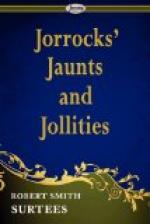“If I had a donkey vot vouldn’t go.”
At the conclusion of the song, and before the company had time to disperse, the same smart young gentleman,—having rehanded the young lady from the orchestra and pocketed his gloves,—ran his fingers through his hair, and announced from that eminence, that the spirited proprietors of the Bazaar were then going to offer for public competition in the enterprising shape of a raffle, in tickets, at one shilling each, a most magnificently genteel, rosewood, general perfume box fitted up with cedar and lined with red silk velvet, adorned with cut-steel clasps at the sides, and a solid, massive, silver name-plate at the top, with a best patent Bramah lock and six chaste and beautifully rich cut-glass bottles, and a plate-glass mirror at the top—a box so splendidly perfect, so beautifully unique, as alike to defy the powers of praise and the critiques of the envious; and thereupon he produced a flashy sort of thing that might be worth three and sixpence, for which he modestly required ten subscribers, at a shilling each, adding, “that even with that number the proprietors would incur a werry heavy loss, for which nothing but a boundless sense of gratitude for favours past could possibly recompense them.” The youth’s eloquence and the glitter of the box reflecting, as it did at every turn, the gas-lights both in its steel and glass, had the desired effect—shillings went down, and tickets went off rapidly, until only three remained. “Four, five, and ten, are the only numbers now remaining,” observed the youth, running his eye




